Previously on Drokk!: As co-creator John Wagner once again takes sole control of Mega-City One, writing the series for both 2000 AD and the Judge Dredd Magazine, a new calm settles on the future lawman’s world. A calm called, “these comics are just… good, aren’t they…?”
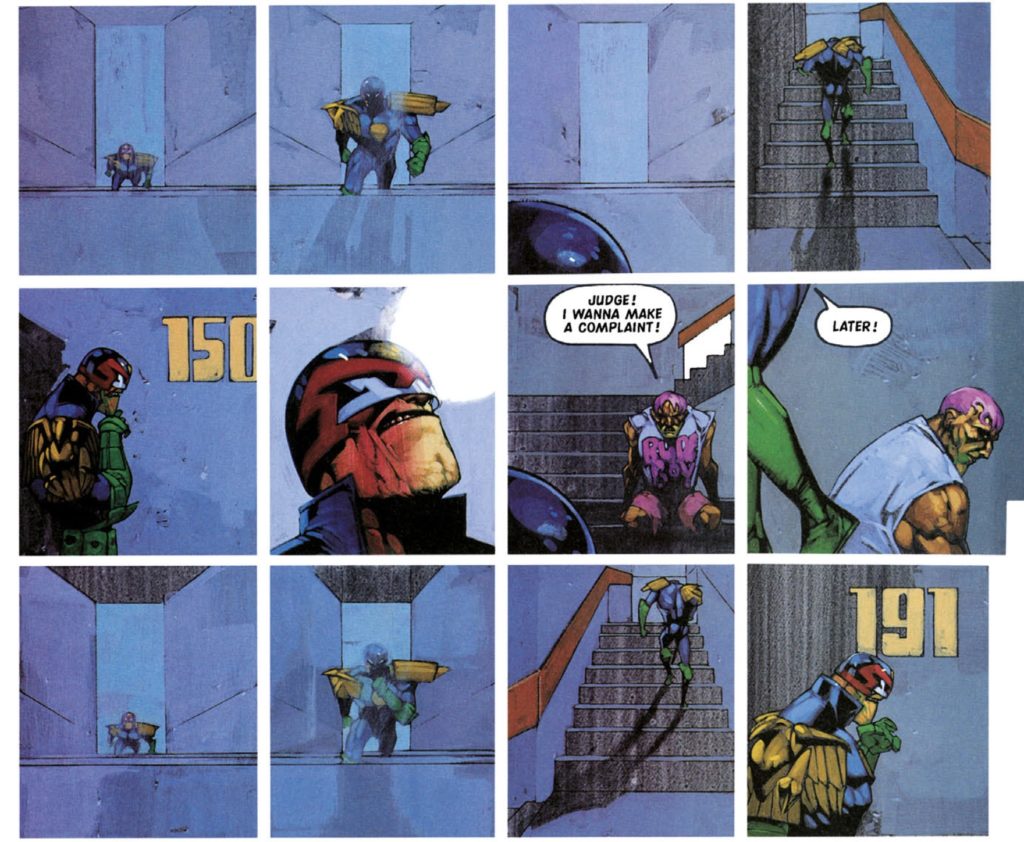
0:00:00-0:04:40: After a cold open that accidentally foreshadows the episode to follow, we introduce the book we’re discussing this episode — Judge Dredd: The Complete Case Files Vol. 28, which contains material from 2000 AD Progs 1084-1099, and 1101-1110, and Magazine Vol. 3 #2 39 through 45, all from 1998 — and I manage to get John Wagner’s name wrong after 31 episodes. “Alan Wagner,” indeed. What was I thinking? Also discussed: that we’re in a “comfort food” era of Dredd, where the high quality comes with a familiarity that’s hard to ignore. (Or, for that matter, define.)
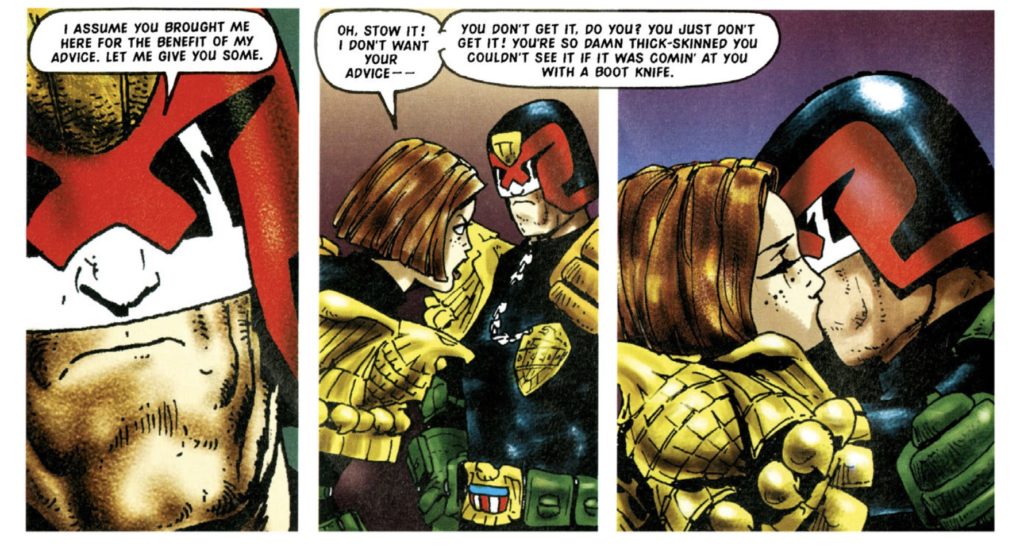
0:04:41-0:14:15: We dive into the longest story in the book, “Beyond the Call of Duty,” which is a quasi-sequel to “The Pit,” the mega-epic from a few volumes back that Jeff and I loved a lot. That’s less true here, and we talk about the reasons why: how the story underwhelms in terms of emotional arc, and hurts one of the two main characters in the process, Jeff’s comparison to the work of Joe Esterhaus (and who saw that coming?), and the unexpected debt Ed Piskor’s Red Room owes this storyline, whether he knows it or not. Galen Demarco deserves better, dammit.
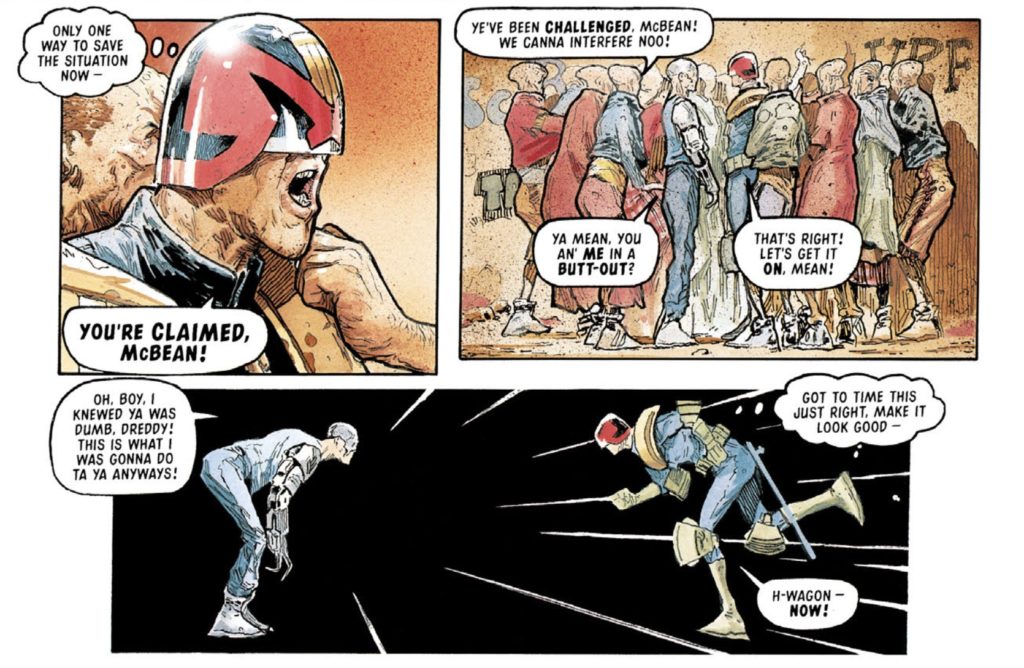
0:14:16-0:25:04: This is a really good looking book, and we talk about the art a little bit, singling out Alex Ronald, Trevor Hairsine and John Burns as standout artists — Siku, too, is a standout, but not for good reasons; we go into depth with the ways in which his work isn’t hitting the mark. In addition to my love for Ronald’s “Handbangers” story, Jeff also points out one of the reasons why this volume feels particularly strong in terms of visuals: the artists are, for the most part, getting stories that work with their strengths.

0:25:05-0:49:44: Following on from the previous episode, we talk about the return of “Judge Dad,” AKA the idea that, under Wagner, Dredd will occasionally be the voice of moral authority in a way that arguably steps outside the confines of the strip as it’s previously existed. This means touching on both “A Death in the Family” and “Sex, Lies, and Vidslugs,” two Magazine stories that see Wagner’s anger feed into his satire, with Jeff putting forward the idea that the serious stories are jokes, and the joke stories are serious, this time around; we also talk about two comedy shorts, “Vidspex” and “No More Jimmy Deans,” that feel as if Wagner is reaching for something larger than the story unfolding on the page. Also under discussion: Is Dredd soap opera, or something else? And is Wagner trying to address that very question in the stories collected in this book?
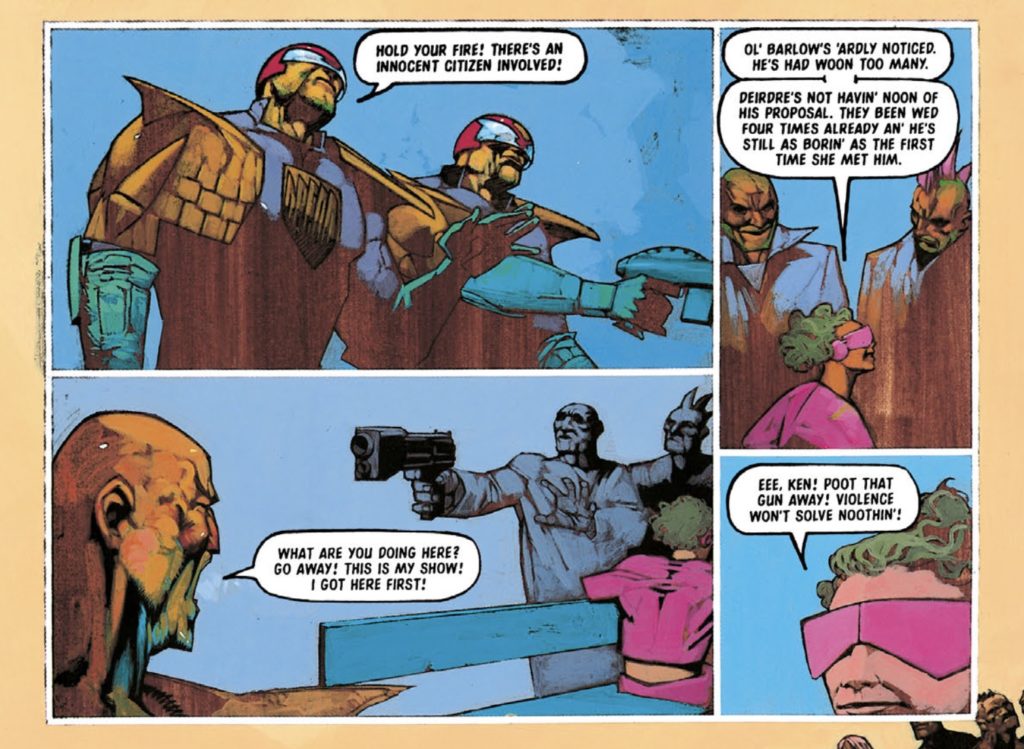
0:49:45-1:07:58: Jeff suggests that Dredd is “flatter” in this book, and we talk about that idea — and the idea that it’s actually difficult to talk about this book because, while the majority of it is very good stuff, it’s also good in such a way that we’ve seen before, and that makes it difficult to have new insight about. It really is a comfort food collection, and we go back and forth about what that really means, and if we should be concerned that there’s no particular innovation in this volume. (Short answer: Not really, because Wagner’s shown himself to recover from this kind of lull before, and also, these lulls are so damn enjoyable.)
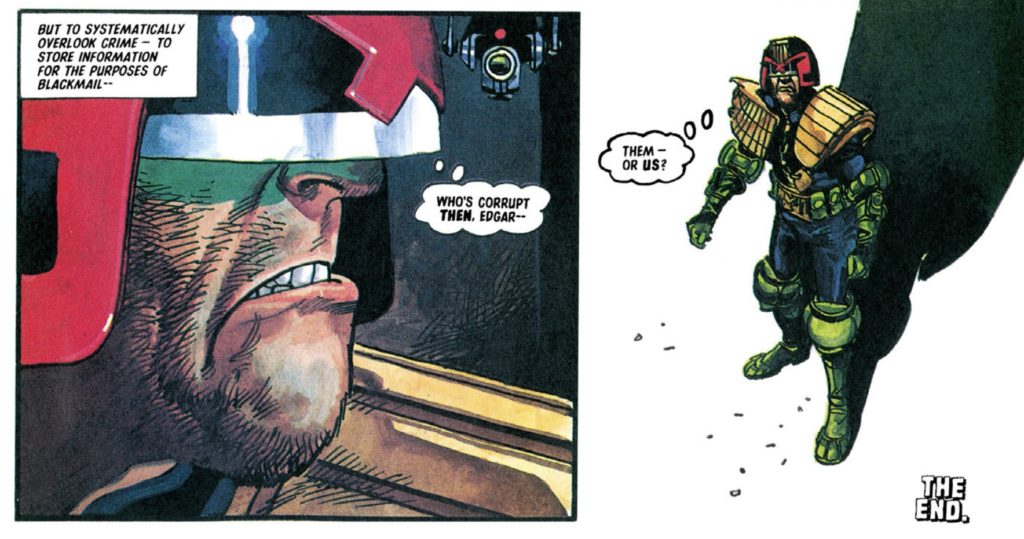
1:07:59-1:19:13: What are our favorite stories in this volume? For me, “Headbangers,” for Jeff, “Sleaze”; our least favorite story, as it turns out, is the same: “The Bouncy Brats Heist,” although Jeff leaves space for “Vidspex,” a story so utterly undermined by its artist at a time when the artist/story pairing has been unusually strong. Also, is this Drokk or Dross? The answer… won’t surprise you at all, honestly.
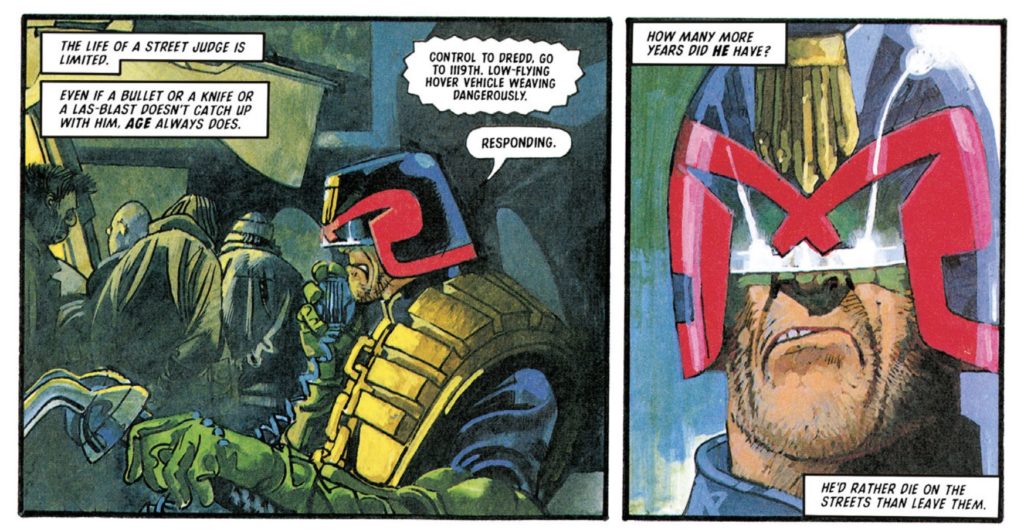
1:19:14-end: We look ahead to the next couple of volumes, before closing out the episode as we always do — mentioning our Instagram, Twitter and Patreon accounts. Next time: more Wagner, but with an unexpected return of Alan Grant, of all people. Be here in a month, dear Whatnauts, and until then, thanks as ever for reading and listening.


I found Siku’s art in this volume to be really bad, but it certainly wasn’t helped reading it digitally one page at a time. There were definitely a bunch of two-page spreads in their stories, but I never realized I was reading one until I was on the second page. The stories made slightly more sense when I read the panels horizontally across two pages.
I don’t remember what Jeff said, but I was certainly critical of Alex Ronald’s work in The Pit. It was a merciless introduction, filling in episodes that Ezquerra didn’t do is a great example of the deep end of comic art. By the time of these issues he’s improved to a point where I think the work is unrecognisable as being by the same person. He’s reworked everything and it looks great. I remember Graeme saying good things about his Dredd debut and wonder if they were coloured by his knowing how good he would become?
I was wondering if the cloning stories might have been around the same time as Dolly the sheep. Dolly was announced to the public February 1997 and No More Jimmy Deans was out March 1998, so not exactly, but probably close enough to be seen as a factor.
Beyond the call of duty— our hosts said quite a lot about how it made DeMarco look stupid, but not so much about whether this whole idea of having her have romantic feelings about Dredd was good idea in the first place.
I really don’t think that it was.
Part of this is that lurking in the background here we have that moment in Wilderlands when Castillo finds Dredd attractive.
In general, I think Wagner is not very good at writing about sex, at least not in anything that I’ve read. (He’s good at married couples, though.) When sex enters the picture, Wagner tends to default to sexpot (or literally sexbot) women who are the objects of male desire in a leering adolescent way. Simultaneously appealing to the prurient interest of the reader *and* shaming him (the implied reader damn well is a “him”) for it at the same time. One senses a lot of old-fashioned male sexual repression at work here.
And when it comes to the possibility that women might be people who feel sexual desire — well, this is twice now that Wagner has decided that a Dredd story that he wants to tell is how an older man mentors a “flawed” attractive younger woman, who totally has the hots for her older mentor, but he’s too pure ever to think about it.
Umm, Mr. Wagner…
In Castillo’s case this plotline was abortive. But one has the horrible feeling that this might be because Wagner decided that it was a story with such potential that he needed to lay some real groundwork for it, set the younger woman up properly as a character first.
And part of that is something that I think is really not a good idea at all. Part of making DeMarco the younger female character in question is that Wagner seems to think that it’s a good idea to mix this up with a difference of principle: that DeMarco is against judge celibacy while Dredd isn’t.
The thing is, if we’re going to take judge celibacy seriously as something that’s supposed to work, or not, in the “real world” (i.e. not the sexless world of the boys’ comic 2000 AD c.1980), something that’s worth treating as a real debate, with plausible arguments on both sides, then you *absolutely* need to talk about it in the same way one might talk about clerical celibacy in the Catholic Church, which is to say a way that’s serious and realistic about people’s feelings and desires — that would talk about sexual desire as something that judges will inevitably feel, but which they need to deal with for some larger good.
And Dredd is a $%$^ing terrible character for that. Because this entire story that Wagner seems so creepily determined to tell turns on the older man not feeling any attraction at all in any way to the younger woman.
OK, Dredd might as an *individual* be asexual. But most people aren’t, and most judges aren’t going to be. There’s no possible debate there.
Or perhaps Dredd is so completely repressed that he doesn’t acknowledge, even to himself, that he can feel sexual attraction. There’s maybe a hint of Dredd not knowing his own self when he wonders why he isn’t reporting DeMarco. But it’s a very faint and ambiguous hint at most. It’s easier to read that as part of the established tension between Dredd as believer in the rules and person who wants to give second chances to “good judges” who make mistakes. (Esp. with Roffman the unbalanced fanatic there as the point of contrast.) And even if it is there, it’s like Dredd being asexual. There’s no debate there. What would suit that would be a story that explored how deeply psychologically unhealthy Dredd is.
No, there’s only option 3. Dredd is a fantasy of a man[sic] who is so self-disciplined that he has eradicated sexual desire within himself. Which is the same as option 2, repression, one might respond, but the difference is that it’s there to be celebrated and admired, longed for as a state one might achieve. This proceeds, of course, from the same place as the leering/shaming handling of male sexual desire.
And then Wagner just *has* to have his idealized sexless older man be so irresistibly attractive to a younger woman that she does stupid and unprofessional things as a result. Not just the kiss, not just the “He does care” stuff — it’s implied that DeMarco’s romantic feelings are why she used her power as sector shief to have Dredd assigned to her sector.
There’s a very familiar strain of misogyny here, frankly.
So…
I accidentally bought Case Files 29 instead of 28, and I only noticed my error when I sat down to read it and I recalled Graham saying the next volume would be ALL Wagner. Sure enough, these show notes go live and I had the wrong volume. Finally got caught up, and what a great episode. It’s been awhile since we’ve had such an overwhelming amoung of good Dredd to contend with. I think, as always, your perspicacious banter hits every nail on the head. I only had a few thoughts to add.
–I found it interesting that the majority of the 2000 A.D. strips collected here were focused on the goings on or the cits of Mega-City One. Headbangers, When the El Breaks, and Beyond the Call of Duty were the only real Dredd-oriented tales. The others were about the world of Dredd, and I liked that. Of course, they suffer from that perennial short story issue with not having enough to sink your teeth into, but still they were good nonetheless.
–Judge Dad (Dad Dredd?)–I can see it! But to me it felt more like a paternalistic vigilante, one who Dredd has met. Of course I speak of none other than The Batman. I was getting strong Batman vibes from this volumes Dredd, especially as he took the law into his own hands a number of times for the sake of the greater good (Sleeze, A Death in the Family–also the name of an infamous Batman tale!). Way more Judge Dad or likeable vigilante here than the fascist Dredd I’m used to. Is Wagner dialing that back because his Dredd has matured (likely!) or because he doesn’t agree anymore that Dredd is fascist (unlikely)? I hope we get back to the double-edged sword type Dredd soon.
–I feel the computer coloring is not doing Ezquerra’s art any favors, and might be actively turning me against him, except for the fact I really love how he draws Dredd.
–Teletubbies and Tony Blair! Seeing direct or oblique references to these things made me at once feel this book had entered the modern era AND felt dated at the same time. It’s possible that it’s because I was on the cusp of young adulthood when those things happened that I feel that way. I remember the media’s reaction to Tony Blair’s election being much more positive (not sure about the person in the streets, especially in the U.K.), so it feels odd that Wagner was so anti-Blair from the outset, pre-Iraq War. I don’t think he wanted to the Conservatives to have stayed in power, and just because he despises the one doesn’t preclude him from criticizing the other. I wonder if he saw something in early year of Blair that other didn’t, or if he’s just continuing the long-held British tradition of shitting on whoever’s in charge of Labour.
–Siku–gotta go. Don’t need dime store Bisley.
–I was as disappointed with Beyond the Call of Duty as much as you. As the closest thing to a megaprog here, I had higher hopes for it. I think it could have worked better if we had gotten to see more of the day-to-day of the sector. This might sound crazy, but If Stone Killer has been one of the side stories in Beyond, I think it would have rounded it out more nicely, maybe set up more conflict with the JSA judge or Dredd/DeMarco and the other judges. I agree with Voord that DeMarco being romantically interested in Dredd just felt icky and contrived. If she had been trying to use the kiss to prove to Dredd that he too has emotions, as part of a bigger undercurrent to the story, I could maybe accept it. But she just comes off as stupid for trying, and, like Voord said, it taints the reasons she brought Dredd there in the first place and really changes the tenor of that plot
–Reading the title “No More Jimmy Deans,” I thought it was going to be about the American sausage patty company, especially since we had a sausage story earlier in the volume.